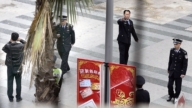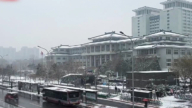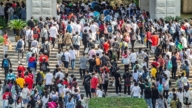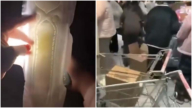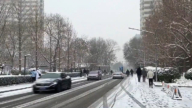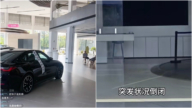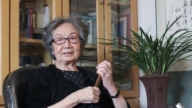【新唐人2013年12月13日讯】中国周日发布的11月份出口数字大幅飙升,一些观察者认为因素之一是,公司虚报出口价值,作为规避当局限制将热钱转入中国的一个方式。外媒指出,中国境内外利率的大幅差价造成热钱无孔不入。中共资本控制的这堵墙越来越千疮百孔。
美国《华尔街日报》12月9号报导说,中国大陆出口虚报发票的情形,在一年之前也曾经发生。而今年 11月份的出口价值同比飙升了12.7%,和使用人民币进行贸易融资增加,让一些分析师担忧企业故伎重演。
总体上中国的利率高于亚洲其他国家,这制造了一个强有力的激励,让投资者在国外借贷资金,然后到国内投资。
北京天则经济研究所所长助理段绍译:“因为在市场比较发达的国家,它的贷款利息只有2-4%,而中国的贷款利息有6-12%,存款利息在国外是1%以下,中国的存款利息一年定期有3.15%,所以这种利率差也是其中一个原因。”
北京“天则经济研究所”所长助理段绍译指出,西方国家是真正的市场经济国家。市场经济的价格是由市场来决定的。而中国不是真正的市场经济,所以资本的价格受到政府的干预影响。特别是政府对土地、资本的管制,人为的扭曲了市场的价格,所以中国的价格表现不真实。
段绍译:“利率高主要因为中国对金融市场的管制。让金融市场的资本严重的供不应求,中小企业很难贷到银行的款。比如中国政府每年宁可去买美国的国债,也不借给自己的企业家。它也不允许企业自己使用支付它的外汇。造成人为的稀缺。”
大陆银行间资金持续紧张的状况仍未缓解,相关利率与往年相比大幅升高。 12月9号,据上海银行间同业拆放利率(Shibor)网站显示,隔夜利率已经达到3.6200%,而在2012年12月10号,隔夜利率仅为2.2490%。
另外,人民币兑美元即期汇率9 号达到6.0715,再创新高。同一天,人民币兑美元汇率中间价报6.1130,较前一跤易日继续大幅上涨102个基点,也再创新记录。业内人士表示,人民币汇率本轮升势可能仍将持续,而境内外汇差、和利差,已经引得更多热钱通过贸易渠道回流大陆,这个迹象愈发明显。
除了热钱流入赚取利率差,段绍译认为,虚报出口货值的另外一个重要原因是,当局给予出口的退税。企业产品卖到国内和国外,它的利润不一样。卖到国内要交税,卖到国外就可以退税。
段绍译:“在中国,老百姓上有政策,下有对策。补贴跟走私是一对孪生姊妹。比如说,出口退税就会让有些人开假发票,关税收的高就会让有些人走私。其实真正解决这个问题的根本原因,是适当降低补贴甚至取消补贴,真正让中国融入到全球市场当中去。”
《华尔街日报》报导说,公司企业有各种各样的把戏来规避中共当局的资本控制。公司可以夸大他们的出口价值,或甚至把实体货物运出海关,然后再走私回来。或者,他们可以使用信用证从香港银行获取廉价资金,然后将它们转回大陆并放在理财产品里面,直到还款到期的时候。
不管机制如何,它们的目标是一样的,就是﹕从海外以很低的利率借钱,然后把这些现金投入到高收益的中国投资当中。
《华尔街日报》的报导认为,境内外利率大幅的差异,让投资者无孔不入的钻资本控制的漏洞。只要赚取快钱的机会存在,热钱的流动将继续找到它跨越国境的方式。报导引述“澳新银行”专家刘立刚的结论﹕降低利率,可能是中共可以化解资本流入压力的唯一方式。
但是这让大陆的央行左右为难。此刻,它正在提高利率,以打击持续的过度投资,和大规模的债务积聚。
采访编辑/秦雪 后制/李勇
Dramatic Rise in China Exports Results from Imported Hot Money
Last Sunday, China issued its November
export figures, which showed a dramatic rise.
Some observers attribute the key drive is higher export
values that are fraudulently declared by exporters.
This is a crucial method for transferring laundered
money into China by evading regulations.
International media reported that there is a
significant interest gap between China and
overseas, which attracts pervasive hot money.
The Chinese Communist Party’s wall for controlling
capital has become increasingly full of holes.
According to a Wall Street Journal report on
December 9, fiddling invoices for higher export
values occurred one year ago in China.
This November’s exportation figure was
12.7% higher in comparison to last month.
The increase of trade finance by Renminbi suggests to
some analysts that fiddling export invoices has recurred.
Overall, Chinese interest rates are
higher than other countries in Asia.
This strongly stimulates investors to borrow overseas
money and then to invest in Mainland China.
Duan Shaoyi, Assistant Director of Beijing Unirule
Institute of Economics: “In those countries with
developed market, loan interest rates are only 2-4%.
In China, it’s 6-12%. Similarly, overseas deposit
interest rates are less than 1%, whereas in
China it’s 3.15% for a one year team deposit.
Therefore, such a significant interest gap is one
of the key reasons to drive hot money to flow in."
Duan points out that most western
countries have a real market economy.
Their prices are determined by the market.
However, China is not a real market economy, and
hence capital prices are interfered by the government.
On particular, governmental regulations on land
resources and capital twist the market prices.
So the prices in China are not real ones.
Duan Shaoyi: “High interest rates result from
China’s regulations on the financial market.
This causes a serious shortage of the capital
supply, and difficulties for medium and small
sized enterprises obtaining loans from the bank.
The Chinese Central Government would rather buy
American bonds than lend money to Chinese companies.
Furthermore, the companies are not
allowed to use their foreign currency.
All of these produce an artificial shortage of capital."
Capital shortage tensions among
China’s banks are still not yet resolved.
The relevant interest rates greatly
rise compared to previous years.
December 9, Shibor website showed
overnight interest rate achieved 3.62%.
It was 2.249% on December 10, 2012.
In addition, the spot exchange rate of RMB to USD
on December 9 touched a new record 6.0715.
There was a median exchange rate of RMB
to USD 6.1130, which rose around 102 basis
points compared with the last trading day.
This was also a new record.
Financial practitioners say that the appreciation
trend of RMB will probably last in the near future.
The differences in exchange rates and interest
rates between domestic and international markets
has already attracted a lot more hot money to
return to Mainland China through trade channels.
The signs are increasingly obvious.
According to Mr Duan, in addition to hot money
making a profit by interest rate differences,
another important reason for false high export
values are tax returns policies for export goods.
The products selling on domestic markets
and overseas markets earn different profits.
This is because sales in the domestic market need to pay
tax, whereas they obtain tax returns in the overseas market.
Duan Shaoyi: “In China, people invent countermeasures
to deal with the policies issued by the government.
Subsidies and smuggling go hand in hand.
For example, tax returns for export cause false
invoices, and high custom duties trigger smuggling.
Actually, the fundamental solution to solving this problem
is to moderately lower and even remove these subsides.
This will allow China to really emerge into the global market."
The Wall Street Journal reports that Chinese companies
innovated a number of tricks to escape capital controls.
They can exaggerate export values, or even smuggle back
those goods after they have been exported through customs.
They can also use credit proof to obtain cheap
capital from banks in Hong Kong, and then transfer
the capital back into the Mainland by packing the
money into financial products until the payment term.
No matter what sort of mechanism
they use, the objectives are same.
They borrow overseas money with a very low interest
rate, and invest the cash in high-profit projects in China.
The Wall Street Journal reports that the significant
difference of interest rates between domestic markets
and international markets triggers investors to
pervasively exploit the loopholes in capital control.
As long as there is the chance of rapid making money,
hot money will continue to find its ways across the border.
The report cites the conclusions
by ANZ Bank expert Liu Ligang:
“To reduce interest rates might be the only way for
the CCP to deal with the pressure of capital flowing in."
However, this would plunge the
Mainland Central Bank into a dilemma.
At the moment, it is increasing interest rates
to hit lasting over-investment and the
accumulation of very large scale debts.
Interview & Edit/QinXue Post-Production/LiYong


